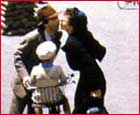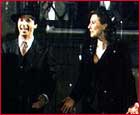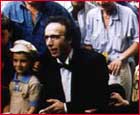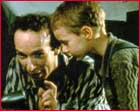Brilliant, sensitive, serious cinema
Ruchi Sharma
 A sensitive story about an ingenious father who will do just about anything for his son, and will willingly give up his life for the love of his wife.
A sensitive story about an ingenious father who will do just about anything for his son, and will willingly give up his life for the love of his wife.
That would be a decent summation of Roberto Benigni's Life Is Beautiful.
This is not the kind of film you will watch for entertainment, despite the fact that there is a lot of extremely good comedy in the first half of the film.
The story of Guido (Roberto Benigni), a Jew caught in the horrors of the Holocaust.

Rather than a story that focuses on the horrors of Nazi concentration camps, Life Is Beautiful brings forth the fact that caste, religious belief and nationality are not enough grounds for hatred among men.
After being dragged into a concentration camp, Guido wants only to shield his helpless son, Giosue (Giorgio Cantarini) from execution by being thrown into a furnace. How he goes about forms is the story of the film.
The story begins with Guido, a young, intelligent Jewish entrepreneur who arrives in a small town in Italy to make a living for himself. He bumps into Dora (Nicoletta Braschi), who comes from a rich family and is already engaged to man of a social standing similar to hers.
 Eventually, love conquers all, and Guido and Dora are married despite financial insecurities and instability. Theirs is a relationship where there is a lot of love -- which carries them through.
Eventually, love conquers all, and Guido and Dora are married despite financial insecurities and instability. Theirs is a relationship where there is a lot of love -- which carries them through.
Post-intermission covers the Holocaust. When Guido and his son are stuck in a concentration camp, he has to come up with a bold and unique plan to convince his son that the situation they are in is a game, the aim of which is not to be seen by the soldiers.
Guido manages to hide his son for a long time in the camp without either of them getting caught.
The ending, which is barely predictable and extremely sudden and swift, goes straight to your heart. It also reminds you that heinous crimes have been committed in the name of war.
 Life Is Beautiful will seriously reinforce the fact that war has been, is, and always will be a damning waste of life and time.
Life Is Beautiful will seriously reinforce the fact that war has been, is, and always will be a damning waste of life and time.
The film is Italian and dubbed in English. The performances are brilliant -- whether it is the spirited Guido or even the donkey who faces the ire of the Nazis.
The role that takes the cake is that of Giosue, played by Giorgio Santarini, who couldn't possibly be more than five years old.
Especially commendable is the realistic set design, which takes you back to a time when war was a grim reality.
 A good film to watch, for those interested in serious cinema. But for the commercial circuit regulars, stay away.
A good film to watch, for those interested in serious cinema. But for the commercial circuit regulars, stay away.
CREDITS
Cast: Roberto Benigni, Nicoletta Braschi, Giorgio Cantarini, Horst Buchholz
Director: Roberto Benigni
Related feature:
'Our films target the audience interested in alternate cinema'